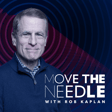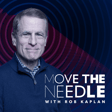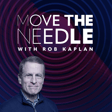
Bill Kurtis
This is Move The Needle with Rob Kaplan. Where we talk to people who lead, innovate, and inspire. Today on the Move The Needle, Rob talks with Bill Kurtis, America's anchorman. You probably know him from NPR's Wait, Wait...Don't Tell Me, or one of the many documentaries he's produced and hosted for his cable network. Bill has had a great career as a journalist and an entrepreneur.
Bill traveled the world for the Peabody Award-winning PBS series The New Explorers and documentaries that have taken on the most pressing environmental issues of our time. Kurtis Productions has created programs for the A&E Network, including the long-running, award-winning Investigative Reports and Cold Case Files, and American Greed seen on CNBC.
Bill anchored the prime time news broadcasts on CBS-owned WWBM-TV Chicago and co-anchored the CBS Morning News from 1982-1986. He also served as a CBS network correspondent.
Currently, he can be heard on NPR Radio as the co-host of the celebrated weekly news quiz, Wait, Wait…Don’t Tell Me. And as the host of the daily news magazine, Through the Decades, taking a look back at each day through the lens of history.
He also provided the satirical narration for the feature film comedy Anchorman: The Legend of Ron Burgundy.
He has authored Bill Kurtis: On Assignment, a review of major news stories he covered accompanied by his own photographs. Using his background as a lawyer, he wrote, The Death Penalty on Trial: Crisis in American Justice, exploring the issues surrounding capital punishment.
#billkurtis #anchorman #NPR #journalism #broadcaster #A&Enetwork #producer #televisionproducer #CBS #coldcasefiles #investigativereports #americangreed #CNBC #americasanchorman #charlesmanson #charlesmansontrial #richardspeck #lindakasabian #catherineshare #documentaries #billkurtisdocumentaries #willferrell #ronburgundy #topeka #universityofkansas #at&t #waitwaitdon'ttellme #thebattleforbunkerhill #movetheneedlewithbullkurtis #movetheneedlewithrobkaplan #samzeff #robkaplan #scottrichardson #ronelgolden


